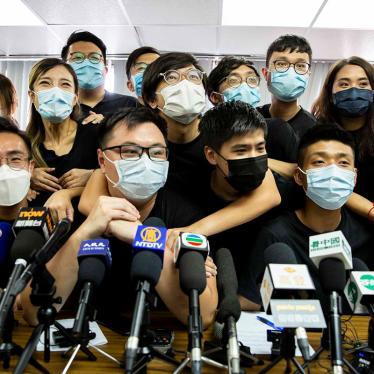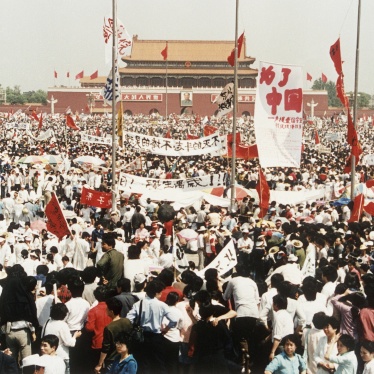(Taipei) – The Chinese government has suppressed fundamental freedoms in Hong Kong in the five years since protesters began occupying city streets on June 12, 2019, and staged months long pro-democracy demonstrations, Human Rights Watch said today. The authorities have since arrested over 10,000 people for their involvement in the protests, prosecuted 2,910 of them, and convicted 1,475, according to government figures.
Foreign governments should seek to hold Hong Kong and Chinese officials responsible for abuses to account, including by imposing targeted financial and travel sanctions.
“Five years since the Hong Kong protests, the government has offered no apology and provided no accountability for police abuses while promoting those responsible for violence to lead the city,” said Maya Wang, acting China director at Human Rights Watch. “Hong Kong is now a city where any criticism of the police or call for justice for that abuse could land one in prison.”
In February 2019, Hong Kong authorities proposed revisions to Hong Kong law to allow extraditing criminal suspects to mainland China, where due process rights are routinely flouted. On June 9, over one million people demonstrated peacefully against the extradition amendments.
On June 12, tens of thousands gathered around the Legislative Council (LegCo), Hong Kong’s semi-democratic legislature, and occupied the adjacent roads. The Hong Kong police fired tear gas, beanbag rounds, and rubber bullets to disperse the protesters, leading to dozens of injuries. Hong Kong’s then-Chief Executive Carrie Lam condemned the protests, calling it “a riot.”
Over the next six months, Hong Kong people staged near-daily protests to press for their “five demands:” withdrawal of the extradition bill; retraction of the official characterization of the protests as “riots;” amnesty for arrested protesters; an independent inquiry into alleged police misconduct; and full universal suffrage for Hong Kong people, as promised by Beijing.
While Hong Kong authorities eventually scrapped the proposed legal amendments, they ignored other demands, including calls for an investigation into police use of excessive force. No officers alleged to have used wrongful force during the 2019 protests have been held accountable. Lam insisted that the existing police complaints mechanism – which is part of the police force – was adequate.
The protests took place throughout the city and often involved large numbers of people. In the largest, on June 16, 2019, organizers estimated that two million people took to the streets in a city of seven million.
“From students and teachers to laborers and lawyers, from activists to teenagers and octogenarians, a large cross-section of Hong Kong society took part in widespread acts of civil disobedience,” Wang said.
Protesters organized strikes, formed 4,000 new labor unions, demonstrated outside police stations, occupied the Legislative Council and the airport and its surrounding streets, and held hands forming a 50-kilometer “Hong Kong Way.” They placed ads in major newspapers around the world, spoke at the United Nations, and pressed foreign governments for support.
The Hong Kong police increasingly used excessive and indiscriminate force against largely peaceful protesters in violation of international human rights standards. Officers fired projectiles including pepper balls, tear gas canisters, and rubber bullets at protesters, including at close range and at people’s faces, causing injuries including blindness.
They fired tear gas inside enclosed spaces, including subway stations and shops; beat protesters on their heads, and chased them in dangerous situations that could have caused stampedes; rammed police vehicles into crowds; and unnecessarily tackled demonstrators to the ground, including pregnant women, children, and older people.
Police on two occasions fired live ammunition at protesters. Some protesters alleged that they were beaten and mistreated in custody, while one said police officers had raped her. Some accused the police of deliberately failing to act when suspected criminal gangs attacked protesters. One protester, Alex Chow Sze-Lok, died during a police operation under circumstances that remain disputed.
The Progressive Scholars Group in Hong Kong reported 1,200 cases of alleged police brutality during the protests between June 9, 2019, and January 21, 2020. Some protesters also took up more violent tactics over time, throwing bricks and Molotov cocktails at the police, and damaging properties owned by pro-Beijing businesses. One pro-Beijing man was set on fire while bricks thrown by protesters killed another.
In December 2019, a group of foreign experts quit the Hong Kong police review bodies out of concern that they lacked the authority to address the abuses related to the protests. In November 2020, the Hong Kong High Court ruled that the government had violated its Bill of Rights by not providing an independent mechanism for complaints about the police. That month, an independent policing expert from the United Kingdom who had quit the Hong Kong review bodies published a report concluding that the indiscriminate use of force by the Hong Kong police escalated the 2019 protests.
As of June 2024, the Chinese and Hong Kong governments have gutted Hong Kong’s civil liberties by imposing two draconian national security laws, crushing the city’s pro-democracy movement by detaining and prosecuting elected representatives, eliminating civil society groups and independent labor unions, and shuttering pro-democracy media, among other measures.
Hong Kong’s abusive police force has gained greater authority and impunity under the leadership of Chief Executive John Lee, a former senior police official, and security chief Ping-Keung Tang, both responsible for the suppression of the 2019 protests. And the Beijing-controlled Hong Kong courts have handed down baseless convictions against pro-democracy leaders and activists; some will face heavy sentences, up to life in prison.
While many foreign governments have expressed concerns about the deteriorating human rights situation in Hong Kong, few have taken concrete action, Human Rights Watch said. In 2020, the United States imposed sanctions on Hong Kong officials for the 2019 abuses, the only government to do so. In the face of continuing repression in Hong Kong, foreign governments should impose sanctions on police officials responsible for the crackdown, Human Rights Watch said.
“Foreign governments should respond to the continued impunity for 2019 abuses against pro-democracy demonstrators by imposing targeted sanctions on senior Hong Kong police officials,” Wang said. “Doing so will send the right message and change the calculations of those leaders intent on turning a once-free society into a highly oppressed state.”








